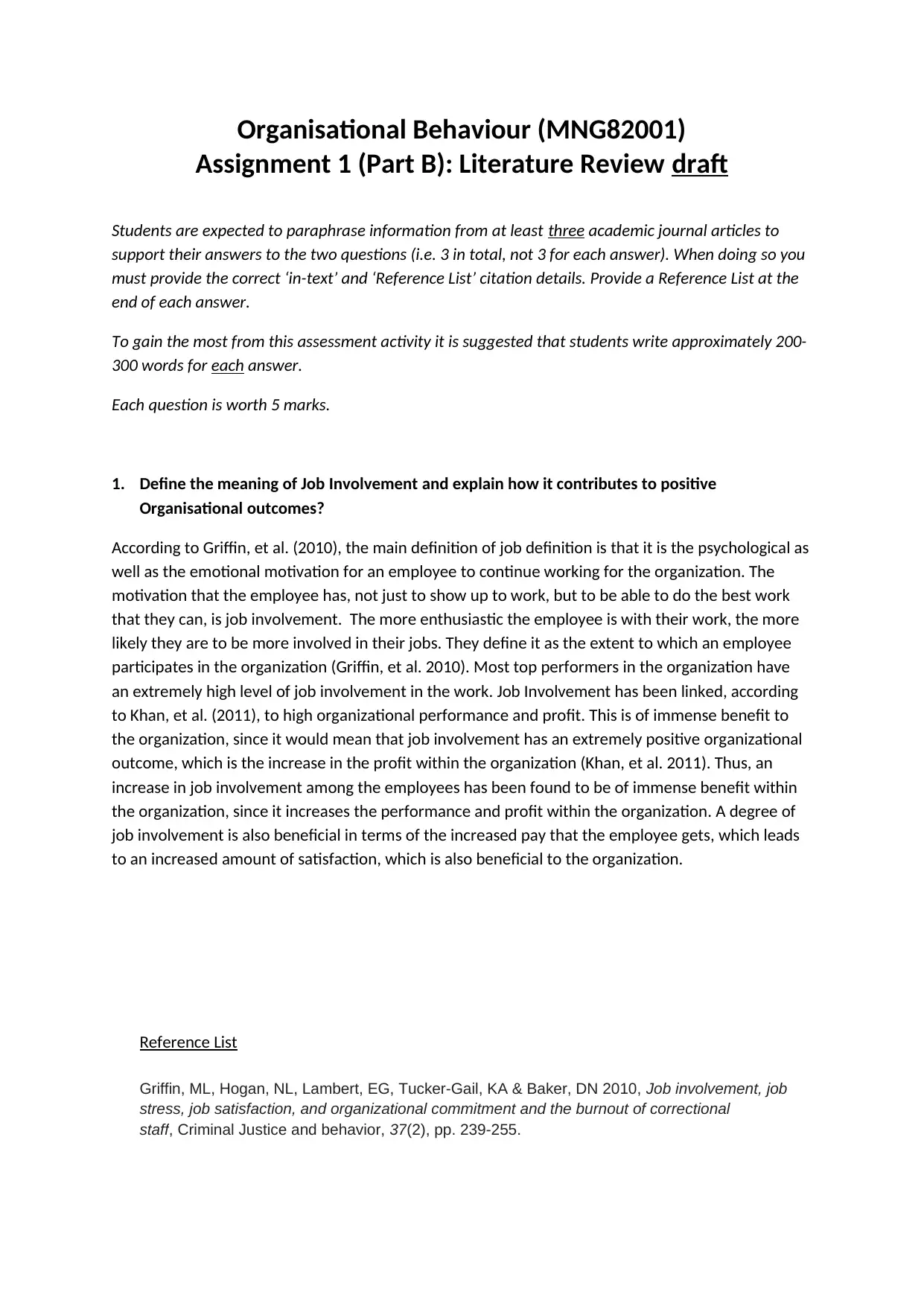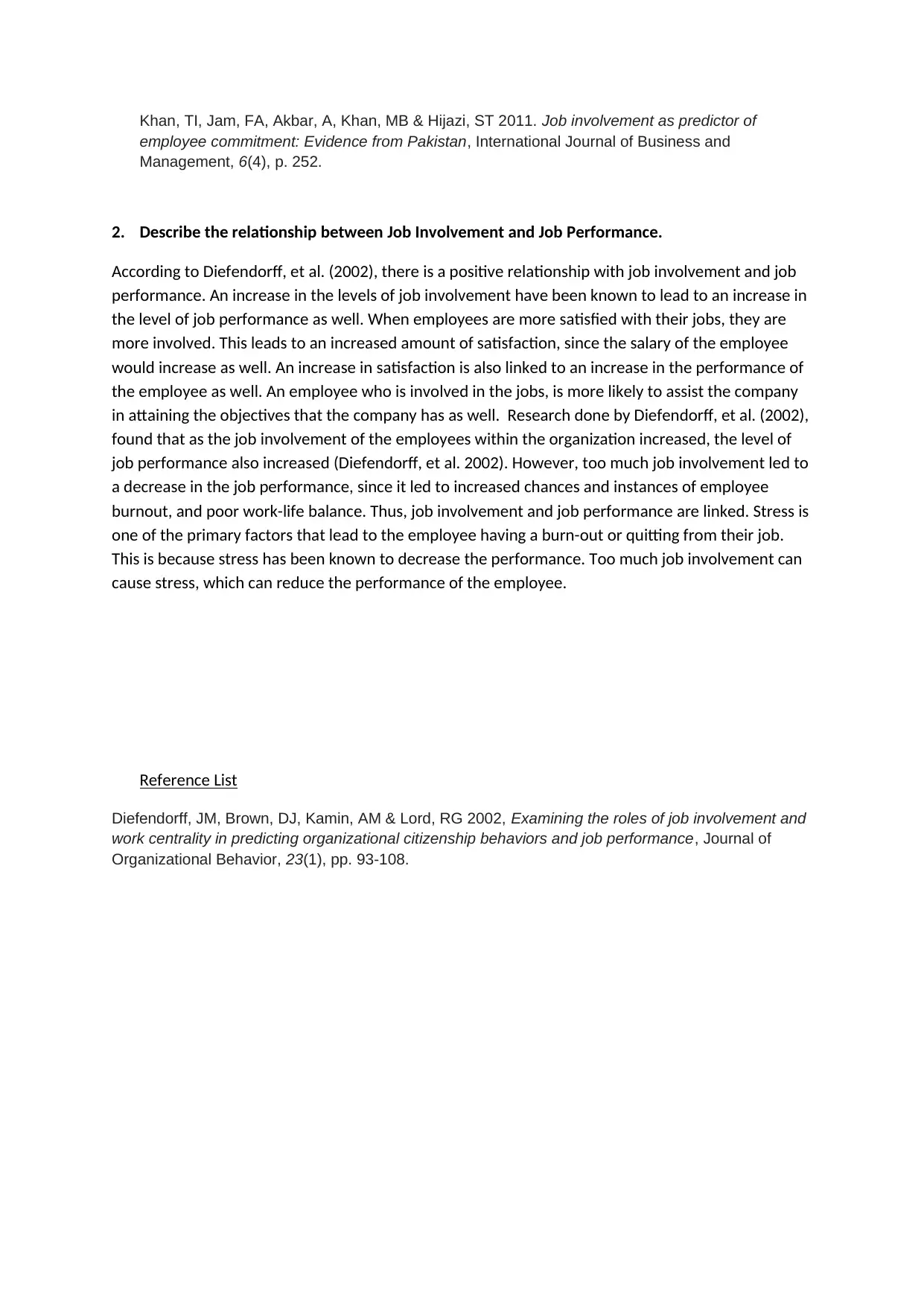MNG82001 Organisational Behaviour: Job Involvement Literature Review
VerifiedAdded on 2023/05/30
|2
|825
|392
Literature Review
AI Summary
This assignment presents a literature review focusing on job involvement and its impact on organisational outcomes and job performance. It defines job involvement as an employee's psychological and emotional motivation to work for an organisation, linking it to increased performance and profitability. The review also explores the relationship between job involvement and job performance, noting a positive correlation up to a certain point, beyond which burnout can decrease performance. The assignment references academic journal articles to support its analysis and provides reference lists for each question. Desklib offers a platform for students to access similar solved assignments and study tools.

Organisational Behaviour (MNG82001)
Assignment 1 (Part B): Literature Review draft
Students are expected to paraphrase information from at least three academic journal articles to
support their answers to the two questions (i.e. 3 in total, not 3 for each answer). When doing so you
must provide the correct ‘in-text’ and ‘Reference List’ citation details. Provide a Reference List at the
end of each answer.
To gain the most from this assessment activity it is suggested that students write approximately 200-
300 words for each answer.
Each question is worth 5 marks.
1. Define the meaning of Job Involvement and explain how it contributes to positive
Organisational outcomes?
According to Griffin, et al. (2010), the main definition of job definition is that it is the psychological as
well as the emotional motivation for an employee to continue working for the organization. The
motivation that the employee has, not just to show up to work, but to be able to do the best work
that they can, is job involvement. The more enthusiastic the employee is with their work, the more
likely they are to be more involved in their jobs. They define it as the extent to which an employee
participates in the organization (Griffin, et al. 2010). Most top performers in the organization have
an extremely high level of job involvement in the work. Job Involvement has been linked, according
to Khan, et al. (2011), to high organizational performance and profit. This is of immense benefit to
the organization, since it would mean that job involvement has an extremely positive organizational
outcome, which is the increase in the profit within the organization (Khan, et al. 2011). Thus, an
increase in job involvement among the employees has been found to be of immense benefit within
the organization, since it increases the performance and profit within the organization. A degree of
job involvement is also beneficial in terms of the increased pay that the employee gets, which leads
to an increased amount of satisfaction, which is also beneficial to the organization.
Reference List
Griffin, ML, Hogan, NL, Lambert, EG, Tucker-Gail, KA & Baker, DN 2010, Job involvement, job
stress, job satisfaction, and organizational commitment and the burnout of correctional
staff, Criminal Justice and behavior, 37(2), pp. 239-255.
Assignment 1 (Part B): Literature Review draft
Students are expected to paraphrase information from at least three academic journal articles to
support their answers to the two questions (i.e. 3 in total, not 3 for each answer). When doing so you
must provide the correct ‘in-text’ and ‘Reference List’ citation details. Provide a Reference List at the
end of each answer.
To gain the most from this assessment activity it is suggested that students write approximately 200-
300 words for each answer.
Each question is worth 5 marks.
1. Define the meaning of Job Involvement and explain how it contributes to positive
Organisational outcomes?
According to Griffin, et al. (2010), the main definition of job definition is that it is the psychological as
well as the emotional motivation for an employee to continue working for the organization. The
motivation that the employee has, not just to show up to work, but to be able to do the best work
that they can, is job involvement. The more enthusiastic the employee is with their work, the more
likely they are to be more involved in their jobs. They define it as the extent to which an employee
participates in the organization (Griffin, et al. 2010). Most top performers in the organization have
an extremely high level of job involvement in the work. Job Involvement has been linked, according
to Khan, et al. (2011), to high organizational performance and profit. This is of immense benefit to
the organization, since it would mean that job involvement has an extremely positive organizational
outcome, which is the increase in the profit within the organization (Khan, et al. 2011). Thus, an
increase in job involvement among the employees has been found to be of immense benefit within
the organization, since it increases the performance and profit within the organization. A degree of
job involvement is also beneficial in terms of the increased pay that the employee gets, which leads
to an increased amount of satisfaction, which is also beneficial to the organization.
Reference List
Griffin, ML, Hogan, NL, Lambert, EG, Tucker-Gail, KA & Baker, DN 2010, Job involvement, job
stress, job satisfaction, and organizational commitment and the burnout of correctional
staff, Criminal Justice and behavior, 37(2), pp. 239-255.
Paraphrase This Document
Need a fresh take? Get an instant paraphrase of this document with our AI Paraphraser

Khan, TI, Jam, FA, Akbar, A, Khan, MB & Hijazi, ST 2011. Job involvement as predictor of
employee commitment: Evidence from Pakistan, International Journal of Business and
Management, 6(4), p. 252.
2. Describe the relationship between Job Involvement and Job Performance.
According to Diefendorff, et al. (2002), there is a positive relationship with job involvement and job
performance. An increase in the levels of job involvement have been known to lead to an increase in
the level of job performance as well. When employees are more satisfied with their jobs, they are
more involved. This leads to an increased amount of satisfaction, since the salary of the employee
would increase as well. An increase in satisfaction is also linked to an increase in the performance of
the employee as well. An employee who is involved in the jobs, is more likely to assist the company
in attaining the objectives that the company has as well. Research done by Diefendorff, et al. (2002),
found that as the job involvement of the employees within the organization increased, the level of
job performance also increased (Diefendorff, et al. 2002). However, too much job involvement led to
a decrease in the job performance, since it led to increased chances and instances of employee
burnout, and poor work-life balance. Thus, job involvement and job performance are linked. Stress is
one of the primary factors that lead to the employee having a burn-out or quitting from their job.
This is because stress has been known to decrease the performance. Too much job involvement can
cause stress, which can reduce the performance of the employee.
Reference List
Diefendorff, JM, Brown, DJ, Kamin, AM & Lord, RG 2002, Examining the roles of job involvement and
work centrality in predicting organizational citizenship behaviors and job performance, Journal of
Organizational Behavior, 23(1), pp. 93-108.
employee commitment: Evidence from Pakistan, International Journal of Business and
Management, 6(4), p. 252.
2. Describe the relationship between Job Involvement and Job Performance.
According to Diefendorff, et al. (2002), there is a positive relationship with job involvement and job
performance. An increase in the levels of job involvement have been known to lead to an increase in
the level of job performance as well. When employees are more satisfied with their jobs, they are
more involved. This leads to an increased amount of satisfaction, since the salary of the employee
would increase as well. An increase in satisfaction is also linked to an increase in the performance of
the employee as well. An employee who is involved in the jobs, is more likely to assist the company
in attaining the objectives that the company has as well. Research done by Diefendorff, et al. (2002),
found that as the job involvement of the employees within the organization increased, the level of
job performance also increased (Diefendorff, et al. 2002). However, too much job involvement led to
a decrease in the job performance, since it led to increased chances and instances of employee
burnout, and poor work-life balance. Thus, job involvement and job performance are linked. Stress is
one of the primary factors that lead to the employee having a burn-out or quitting from their job.
This is because stress has been known to decrease the performance. Too much job involvement can
cause stress, which can reduce the performance of the employee.
Reference List
Diefendorff, JM, Brown, DJ, Kamin, AM & Lord, RG 2002, Examining the roles of job involvement and
work centrality in predicting organizational citizenship behaviors and job performance, Journal of
Organizational Behavior, 23(1), pp. 93-108.
1 out of 2
Related Documents
Your All-in-One AI-Powered Toolkit for Academic Success.
+13062052269
info@desklib.com
Available 24*7 on WhatsApp / Email
![[object Object]](/_next/static/media/star-bottom.7253800d.svg)
Unlock your academic potential
Copyright © 2020–2026 A2Z Services. All Rights Reserved. Developed and managed by ZUCOL.





